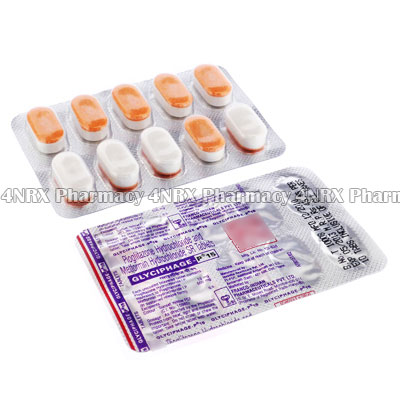 |
Home  Diabetes Diabetes  Glyciphage (Metformin/Pioglitazone) Glyciphage (Metformin/Pioglitazone) |
|
|||||||||
|
|
Glyciphage (Metformin/Pioglitazone)
What is Glyciphage (Metformin/Pioglitazone) used for? Glyciphage (Metformin/Pioglitazone) is an oral medication prescribed to prevent elevated blood glucose levels in patients with type 2 diabetes. The medication lowers blood sugar levels to prevent symptoms such as fatigue, increased urination, blurry vision, faintness, or seizures. It is normally prescribed along with regular exercise and a balanced diet to ensure the most effective results. How should I use Glyciphage (Metformin/Pioglitazone)? Always use Glyciphage (Metformin/Pioglitazone) according to your doctor`s instructions to get the most effective results from treatment. One tablet is typically taken each day along with breakfast or the first meal of the day, but your individual instructions will depend on your age, weight, health condition, and the severity of your symptoms. These should be swallowed along with a large glass of water and food. Do not chew, split, or crush the tablets prior to use as this may destroy or alter the effects of their contents. Ask your pharmacist or doctor any questions you have about the medicine to ensure the correct usage. What are the side effects of Glyciphage (Metformin/Pioglitazone)? Some patients using Glyciphage (Metformin/Pioglitazone) have reported experiencing side effects such as:
Serious side effects that may require emergency medical attention include difficulty breathing, unusual weight gain, vision problems, sensitive skin, easier bruising, urinary retention, pink or red tint to the urine, darkened urine, discoloured stools, or jaundice. Tell your doctor as soon as you experience any serious or worrying side effects to make sure the necessary changes are made to your application frequency or dosage to stop further complications from occurring. Please Note Glyciphage (Metformin/Pioglitazone) should not be used to treat patients who are pregnant, breastfeeding, alcoholics, under the age of eighteen, or who have heart failure, diabetic ketoacidosis, type 1 diabetes, a recent heart attack, reduced blood circulation, dehydration, active bladder cancer, decreased liver function, or decreased kidney function. You are also suggested to inform your doctor if you are a smoker, have a history of exposure to carcinogens, have had radiation therapy of the pelvic area, or if you have a low blood cell count, heart disease, macular oedema, porphyrias, or are a female who has polycistic ovary syndrome. These conditions may cause unexpected problems requiring special adjustments to your regimen. Strictly use Glyciphage (Metformin/Pioglitazone) as prescribed and follow all instructions provided by your doctor. Safe, suitable, and optimum dosage can vary and is dependent on the patient`s health and medical history, as well as the condition you are treating. Glyciphage (Metformin/Pioglitazone) may not be safe or suitable for all patients. Always ensure your doctor is informed if you are pregnant or breastfeeding, using any other type of medication (including non-prescription medicine, vitamins, and supplements), as well as if you have any allergies, other illnesses, or pre-existing medication conditions. Seek immediate medical attention or proceed to your nearest accident and emergency department if you suffer a hypersensitive or allergic reaction. Symptoms usually present during a reaction of this nature include difficulty breathing or swallowing, swelling of the limbs or face, tight chest, hives, and skin rashes. 

|
||||||||||||||||||